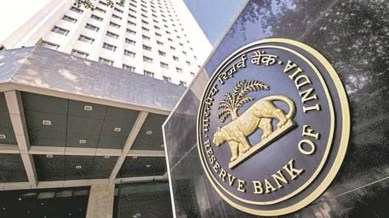RBI supersedes board of Abhyudaya Cooperative Bank for a year, cites poor governance
The regulator has appointed Satya Prakash Pathak, former chief general manager of State Bank of India as administrator to manage the affairs of the urban co-operative bank (UCB) during the 12-month period.

The Reserve Bank of India (RBI) Friday superseded the board of Mumbai-based Abhyudaya Cooperative Bank Ltd for a year over poor governance standards.
The regulator has appointed Satya Prakash Pathak, former chief general manager of State Bank of India as administrator to manage the affairs of the urban co-operative bank (UCB) during the 12-month period.
monthly limit of free stories.
with an Express account.
“Action is necessitated due to certain material concerns emanating from poor governance standards observed in the bank. No business restrictions have been placed by RBI and the bank shall continue to carry on its normal banking activities as is hitherto, under the guidance of the Administrator,” an RBI statement said.
A committee of advisors consisting of Venkatesh Hegde, former general manager of SBI; Mahendra Chhajed, chartered accountant; and Suhas Gokhale, former MD, COSMOS Co-operative Bank Ltd, have also been appointed to assist the administrator, the release said.
The bank’s profit fell 78 per cent to Rs 3.54 crore in the year ended March 31, 2021 from Rs 16.22 crore in the fiscal ended March 31, 2022, as per the information available on the bank’s website.
Loans and advances stood at Rs 6,711.24 crore in the fiscal ended March 2021 as against Rs 6,654.379 as of end March 2020.
Its deposits were at Rs 10,952.44 crore as at March 2021 compared to Rs 10,838.07 crore as at March 2020.
In August this year, RBI governor Shaktikanta Das had asked boards of UCBs to strengthen financial and operational resilience to ensure overall financial and banking sector stability. He urged them to further strengthen governance practices at UCBs, especially the three supporting pillars of compliance, risk management, and internal audit.
Das reinforced the need for board’s involvement in upholding rigorous credit risk management including robust underwriting standards, effective post sanction monitoring, timely recognition and mitigation of incipient stress, rigorous follow up of large NPA borrowers for effective recovery, and maintaining adequate provisioning.
The RBI’s Financial Stability Report (FSR), released in June this year, showed that under a severe stress scenario, the consolidated capital adequacy ratio or CRAR of scheduled UCBs and non-scheduled UCBs diminishes by 194 basis points (bps) and 345 bps, respectively, for credit default risk and by 341 bps and 320 bps, respectively, for credit concentration risk.